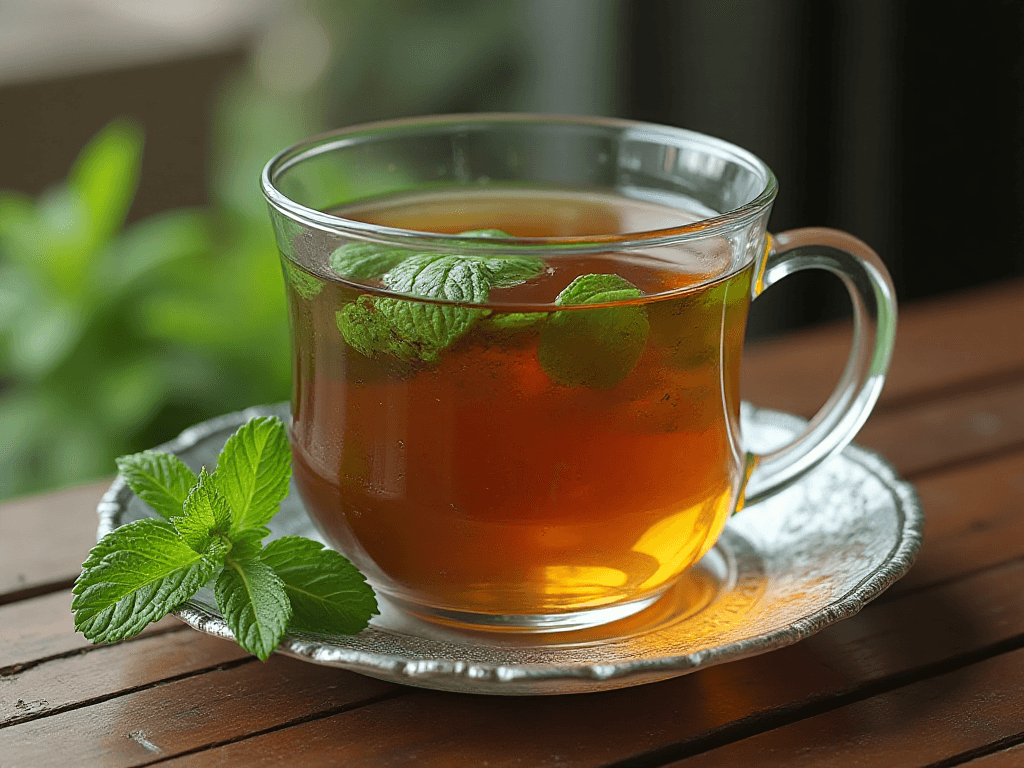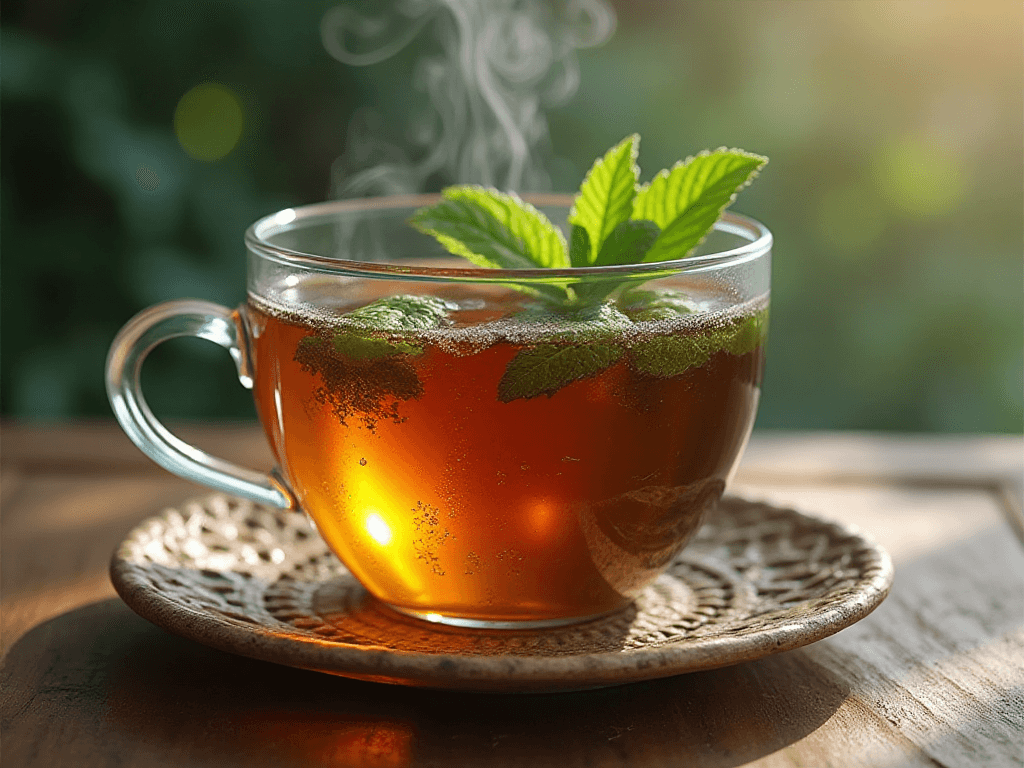How to Make Moroccan Mint Tea: A Step-by-Step Guide to the Perfect Brew
Imagine this: You’re sitting under the golden afternoon sun, the scent of fresh mint dancing through the air as you raise a small glass of sweet, steaming tea to your lips. The first sip is like a warm hug—soothing, sweet, and slightly earthy. This is Moroccan Mint Tea, not just a drink but a cultural experience passed through generations.
Whether you’re drawn to the tradition, the health benefits, or the distinctive flavor, learning how to make Moroccan Mint Tea at home offers a beautiful ritual you can embrace daily. And the best part? You don’t need to travel to Marrakech to enjoy this timeless brew.
Table of Contents
What Is Moroccan Mint Tea?
Also known as Atay, Moroccan Mint Tea is a beloved beverage throughout Morocco and North Africa. It’s more than just a drink—it’s a social custom, a symbol of hospitality, and a ritual that brings people together.
At its core, the tea is a blend of gunpowder green tea, fresh spearmint, and sugar, brewed with intention and served with care. It’s traditionally poured from a height into small glasses, producing a signature froth that locals say “releases the soul” of the tea.
You’re not just making a beverage—you’re preparing a shared moment.

Ingredients Needed for Moroccan Mint Tea
If you’re looking to prepare authentic Moroccan Mint Tea, you’ll need a handful of fresh, quality ingredients. Here’s a quick look at what you should gather:
Essential Ingredients Table
| Ingredient | Quantity | Notes |
|---|---|---|
| Gunpowder Green Tea | 1 tbsp per 2 cups | Traditional and robust in flavor |
| Fresh Spearmint Leaves | 1 large handful | Use “Nana” mint if available |
| Granulated Sugar | 2–4 tbsp | Adjust based on sweetness preference |
| Filtered Water | 2 cups | Clean water = clean flavor |
Optional Additions
- A few drops of orange blossom water for floral notes
- A sprig of lemon verbena or wormwood for an herbal twist
Having fresh mint is crucial. Dried mint won’t give you that vibrant taste. If you can, find spearmint with a strong aroma—it’s what gives the tea its signature punch.
How to Make Moroccan Mint Tea – Traditional Preparation
Making Moroccan tea isn’t just about mixing ingredients. It’s about the ritual, the balance of flavors, and the way it’s served. Follow this step-by-step guide to master the traditional method.
Step-by-Step Instructions
- Boil Your Water
Start with about 2 cups of water and bring it to a rolling boil. - Rinse the Green Tea Leaves
- Place 1 tablespoon of gunpowder green tea into a Moroccan teapot (or any heat-resistant teapot).
- Pour a small amount of boiling water over the tea, swirl for a few seconds, and discard the water.
- This rinses away bitterness and opens the leaves.
- Brew the Base Tea
- Add the rest of the boiling water into the teapot with the rinsed tea.
- Let it steep for 2 minutes to form a strong base.
- Add the Mint and Sugar
- Toss in a generous handful of fresh mint leaves.
- Add 2 to 4 tablespoons of sugar, depending on how sweet you like your tea.
- Simmer gently for 3–5 minutes. Don’t stir yet!
- Pour to Mix
- Now comes the unique Moroccan technique.
- Pour a glass of tea and then return it to the pot. Repeat this 2–3 times to mix the flavors naturally.
- This also aerates the tea, enhancing aroma and taste.
- Serve in Style
- Pour the tea from a height to create foam.
- Serve in small, heatproof glasses and enjoy hot.
Pro Tips for the Perfect Brew
- Always taste before serving. Moroccan tea is meant to be strong and sweet, but not cloying.
- Use a berrad (traditional Moroccan teapot) if you can. Its shape helps with proper infusion.
- Don’t overboil the mint. It should taste fresh and lively, not bitter.
You’ve now got a fragrant, steaming pot of tea ready to serve with pride.

Moroccan Mint Tea Variations
Once you’ve mastered the basic version, feel free to experiment. Different regions of Morocco have their own spins, and you can too.
Popular Variations
- With Orange Blossom Water: Just a few drops added during steeping create a subtly perfumed tea.
- With Lemon Verbena (Louiza): Adds a citrusy, slightly tangy flavor.
- Cold Moroccan Mint Tea: Brew as usual, let it cool, and serve over ice. Great for hot days!
Each version adds a different character but keeps the soul of Moroccan tea intact.
Health Benefits of Moroccan Mint Tea
Drinking Moroccan Mint Tea isn’t just a sensory treat—it’s also packed with wellness perks.
Here’s what your cup offers:
- Digestive aid: Mint soothes your stomach and reduces bloating.
- Rich in antioxidants: Green tea helps combat inflammation and oxidative stress.
- Boosts focus and energy: Contains caffeine but in gentler amounts than coffee.
- Stress relief: The ritual itself is calming, and mint naturally soothes the nervous system.
Backed by Science:
- Studies from the Journal of Medicinal Plants Research highlight mint’s role in digestion.
- Green tea has been praised in Harvard Health Publishing for its heart-health benefits.
You’re not just sipping tea—you’re doing your body a favor.
Serving and Enjoying Moroccan Mint Tea
In Morocco, tea is served with as much attention as it’s brewed. When you share tea, you’re sharing friendship.
Traditional Tea Etiquette
- Tea is often offered three times, each glass getting progressively stronger. There’s even a proverb:
“The first glass is as gentle as life, the second is as strong as love, the third is as bitter as death.” - It’s traditionally served with nuts, dried fruit, or pastries like chebakia or almond briouats.
- Holding the glass with both hands and savoring the aroma is part of the experience.
Frequently Asked Questions About Moroccan Mint Tea
Let’s answer some common questions you might have.
How long does it take to make Moroccan Mint Tea?
On average, about 10–15 minutes. The process is quick, but it invites you to slow down and enjoy.
Can I make Moroccan Mint Tea without sugar?
Absolutely. While traditional recipes are quite sweet, you can skip the sugar or use natural alternatives like honey or stevia.
What type of mint should I use for Moroccan Mint Tea?
Spearmint (also called “Nana” mint) is traditional. If you can find it fresh, that’s ideal.
Can I use loose leaf green tea instead of gunpowder?
Yes, but gunpowder green tea is preferred for its bold, slightly smoky taste and how well it holds up to mint and sugar.
Is Moroccan Mint Tea caffeinated?
Yes, because it uses green tea. However, the caffeine content is lower than coffee.
Conclusion – Brew a Tradition in Your Cup
Now that you know exactly how to make Moroccan Mint Tea, you’re ready to start your own ritual at home. Each pot you brew is more than just a drink—it’s a taste of North African heritage, a symbol of hospitality, and a calming escape from the everyday.
Whether you’re enjoying it solo after a long day or sharing it with friends on a warm evening, Moroccan tea invites you to pause and connect—with yourself and others.

